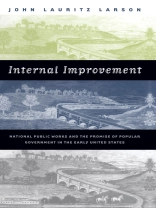When the people of British North America threw off their colonial bonds, they sought more than freedom from bad government: most of the founding generation also desired the freedom to create and enjoy good, popular, responsive government. This book traces the central issue on which early Americans pinned their hopes for positive government action–internal improvement.
The nation’s early republican governments undertook a wide range of internal improvement projects meant to assure Americans‘ security, prosperity, and enlightenment–from the building of roads, canals, and bridges to the establishment of universities and libraries. But competitive struggles eventually undermined the interstate and interregional cooperation required, and the public soured on the internal improvement movement. Jacksonian politicians seized this opportunity to promote a more libertarian political philosophy in place of activist, positive republicanism. By the 1850s, the United States had turned toward a laissez-faire system of policy that, ironically, guaranteed more freedom for capitalists and entrepreneurs than ever envisioned in the founders‘ revolutionary republicanism.
Über den Autor
John Lauritz Larson, professor of history at Purdue University, is coeditor of the Journal of the Early Republic and author of the award-winning Bonds of Enterprise: John Murray Forbes and Western Development in America’s Railway Age.












